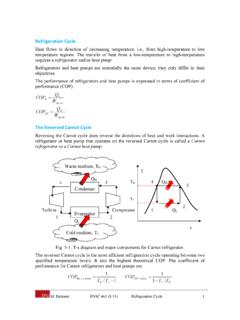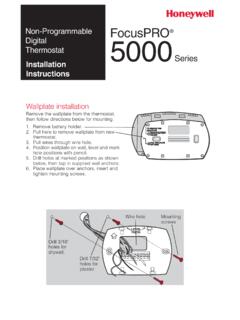Transcription of Water Framework Directive implementation in England and ...
1 Water Framework Directive implementation in England and Wales: new and updated standards to protect the Water environment May 2014 Crown copyright 2014 You may re-use this information (excluding logos) free of charge in any format or medium, under the terms of the Open Government Licence To view this licence visit or email This publication is available at Any enquiries regarding this publication should be sent to us at: PB 14163 Contents 1. Purpose .. 5 2. Introduction .. 6 3. Overview of proposals .. 8 Deriving standards .. 8 Biological assessment methods .. 9 Water quality standards .. 9 River flow and lake level standards .. 10 Invasive non-native species .. 10 Summary of the implications of our proposals .. 10 4. Biological standards .. 12 Overview of biological methods .. 12 Standards for rivers .. 12 Standards for freshwater lakes .. 14 Standards for coastal waters .. 14 Standards for estuaries.
2 15 5. Water quality standards .. 17 Standards for phosphorus in rivers .. 17 Standards for specific pollutants .. 19 Standards for acidity in rivers .. 22 Standards for oxygen conditions and ammonia in rivers in relation to intermittent discharges .. 22 Groundwater quality thresholds .. 25 Groundwater quality standards .. 28 6. Water level and flow standards .. 29 Standards for river flows .. 29 Standards for Water levels in freshwater lakes .. 31 7. Invasive alien species .. 32 8. Next steps .. 34 Appendix 1: Calculation of site specific river phosphorus standards .. 35 Appendix 2: Standards for specific pollutants .. 36 Appendix 3: Reference to UKTAG reports .. 40 5 1.
3 Purpose This document informs interested parties of the details of new and updated environmental standards to be used in the second cycle of Water Framework Directive (2000/60/EC) river basin management planning process in England and Wales. It also presents new and updated assessment criteria for biological elements that must be monitored to assess the ecological status of surface Water bodies. This document does not cover any standards and biological assessment criteria that are unchanged for second cycle . The document should be read alongside the draft updated Ministerial Guidance to the Environment Agency and Natural Resources Wales on River Basin Management Planning which refers to the standards in Chapter 9. The relevant Directions to the Environment Agency and Natural Resources Wales (referred to hereafter as the Agencies) will be updated to give legal effect to the standards by September 2015. 6 2.
4 Introduction The Water Framework Directive (WFD) (2000/60/EC) introduced a comprehensive river basin management planning system to help protect and improve the ecological health of our rivers, lakes, estuaries and coastal and groundwaters. This is underpinned by the use of environmental standards to help assess risks to the ecological quality of the Water environment and to identify the scale of improvements that would be needed to bring waters under pressure back into a good condition. In 2009, prior to the publication of the first river basin management plans, the Agencies were directed by the Secretary of State and Welsh Ministers to apply a range of environmental standards in protecting and improving the Water environment. These 2009 Standards Directions were later replaced by the 2010 Standards Directions. The Agencies were also directed on the use of the standards in assessing the status of the Water environment ( the 2009 Classification Directions ).
5 In parallel, Ministerial Guidance1 included a description of how the Agencies were expected to use standards in classifying the status of Water bodies, regulating controlled activities and setting environmental objectives. The Agencies are now reviewing the River Basin Management Plans for the 2nd cycle (2015 2021) for consultation later this year and Ministerial sign-off by December 2015. Work to review and update classifications and objectives for the 2nd cycle will be carried out on the basis of new and updated standards based on recommendations from the UK Technical Advisory Group ( UKTAG ) on the Water Framework Directive , a partnership of the UK environment and conservation agencies. These recommendations reflect the latest scientific understanding of the standards needed for a healthy Water environment. The technical basis for the standards has already been subject to peer review and public consultation by UKTAG and the updates to the ecological standards reflect the outcome of the latest, peer reviewed work across Europe to harmonise standards for good status.
6 This information document is about the adoption and application of the new and updated standards in river basin management in England and Wales. The 2010 Standards Directions and the 2009 Classification Directions will be updated to reflect these standards prior to finalisation of the Plans. The updated Standards Directions will include these new and updated standards as well as the standards that have not been changed within the current 2010 Directions and which continue to be applicable. 1 River Basin Planning Guidance, 2006 and River Basin Planning Guidance Volume 2, August 2008 7 The Directive 2013/39/EC updating the list of priority substances and priority hazardous substances that will apply to WFD assessment has not been reflected in this document.
7 However, it is our intention to transpose the Directive by updating the list of priority substances in the updated 2010 Directions, such that the standards set by the 2013 Directive will apply for the second cycle river basin management plans. Adopting these new and updated standards has implications for classification of Water bodies and where we target our efforts to protect and improve the Water environment. However, the standards do not dictate the achievement of the WFD objectives, since the latter strikes a balance between protecting the Water environment and enabling its sustainable use. Where, for example, making the improvements needed to achieve the standards required for good status would be disproportionately expensive, we will extend the deadline for the achievement of the objectives or set less stringent objectives. When Ministers agree the final plans they will take into account the balance of costs and benefits and the appropriate phasing of improvements over this 2nd cycle period (to 2021) and beyond to 2027.
8 8 3. Overview of proposals Deriving standards UKTAG is a working group of experts drawn from UK environment agencies and conservation agencies2. It also includes representatives from the Republic of Ireland. UKTAG develops guidance and makes recommendations to the UK's government administrations on technical aspects of implementation of the Water Framework Directive to help with river basin planning. It operates through a series of technical task teams established for specific subjects including chemicals, marine waters; Water resources, groundwater and fresh-waters, and recommendations are made following stakeholder engagement.
9 UKTAG s role includes provision of technical advice on appropriate classification tools and classification rules for chemical, biological and physical quality elements and the environmental standards for achieving different WFD status and how they may be used for river basin planning. The group also offers advice to the Agencies that provide its members. In developing recommendations for environmental standards the UKTAG takes into consideration available scientific and technical evidence and it may commission research into specific areas where the science is not fully understood. UKTAG involved stakeholders in their latest review through workshops and technical consultations on their proposals between April 2012 and July 2013. In presenting its advice and recommendations to the UK s government administrations, UKTAG sought to put into context proposals for new or revised standards by describing the likely changes in WFD status classification at a UK level or at an individual country level where possible.
10 In developing its standards, where possible UKTAG has used ecological data collected from hundreds or thousands of sites. UKTAG has compared these with information for the same sites on the environmental conditions to which the plants and animals are sensitive. This process can identify standards that correspond directly with the ecological definition of good status. In other cases, in estuaries and coastal waters for example, and generally for pollutants not historically subject to big programmes of monitoring, there are insufficient data to derive standards in this way. In such cases, UKTAG has used the current scientific understanding of the causes of ecological change, or the risk of harm in the case of chemicals. UKTAG has compared this understanding with the Directive s biological descriptions of the classes. In doing this, UKTAG has sought advice from independent experts from a range of scientific disciplines. UKTAG has used this 2 Natural England (NE), Environment Agency (EA, England ), Natural Resources Wales (NRW), Northern Ireland Environment Agency (NIEA), Joint Nature Conservation Committee (JNCC), Scottish Environment Protection Agency (SEPA), Scottish Natural Heritage (SNH), Republic of Ireland's Department of Environment, Community and Local Government (DECLG).

















